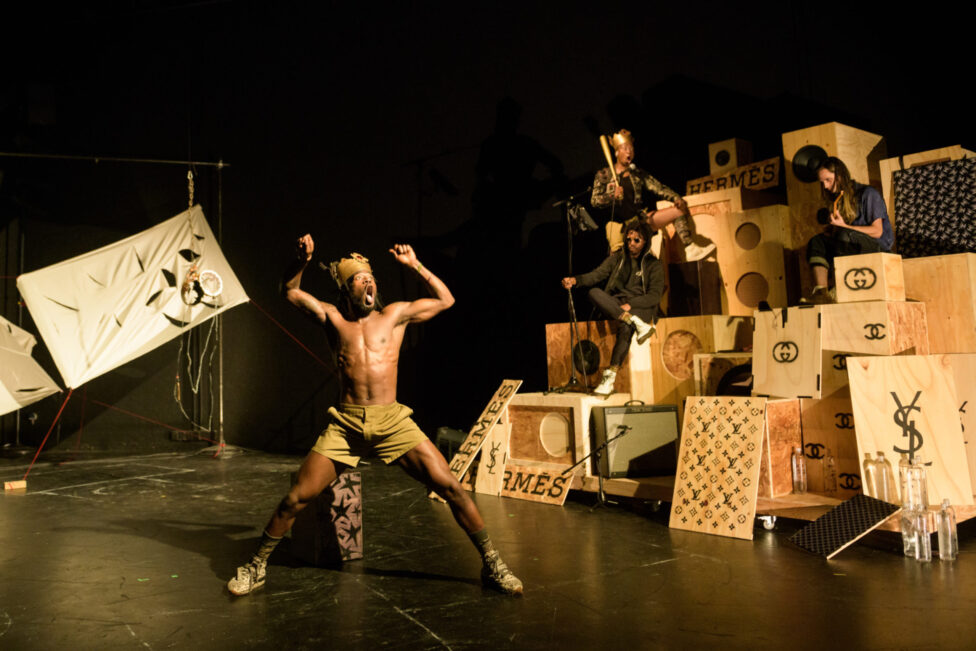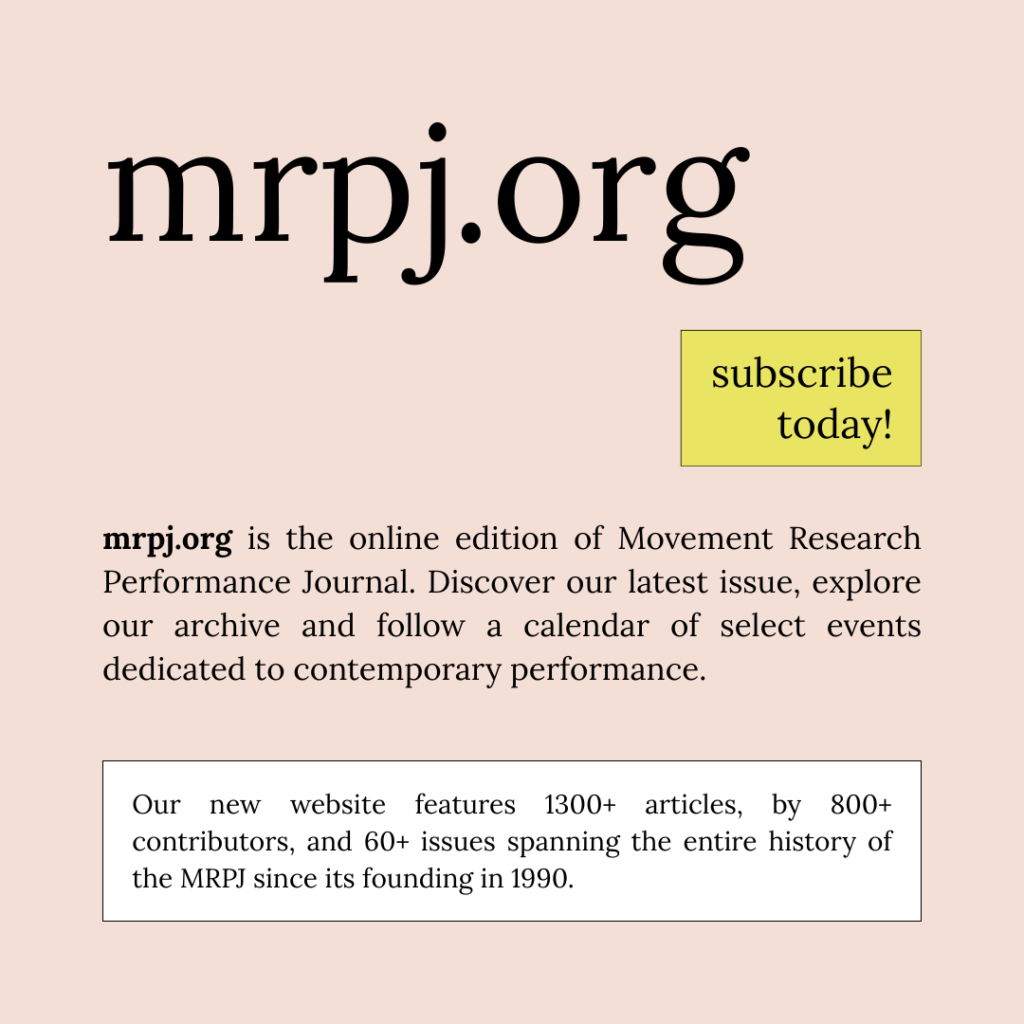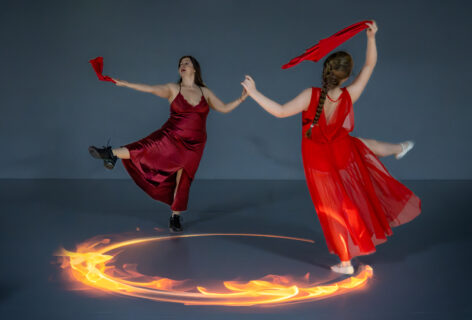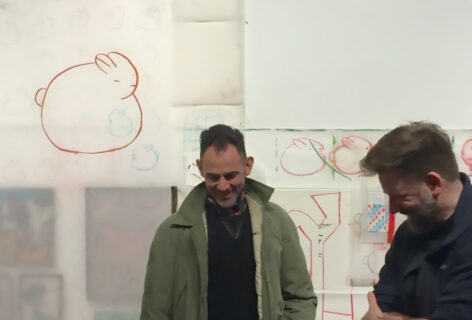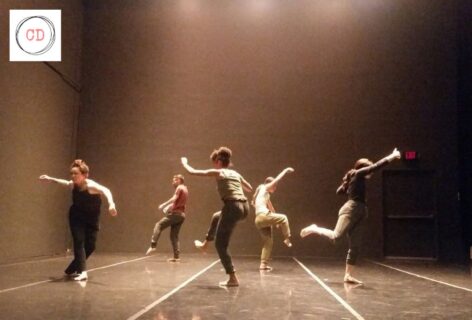Justin Allen: I’ve been working on a series of performances recently that respond to music from my adolescence. I grew up in a DC suburb in Northern Virginia listening to a lot of hardcore and post-hardcore music, and I was usually one of the only black kids at live shows. Much of my recent work is about illuminating and drawing from black influence and participation in DC’s hardcore scene. When I saw your show at The Kitchen, I was immediately attracted to how you’re thinking about the music that influenced you. I’ve similarly had moments where I’ve felt I connected to myself through music figures.
Nora Chipaumire: I think it is awesome when we can pick up threads in other people’s discourses and run with them, accentuating some of those similarities. It makes a body of work and not just mine, but mine, yours, and other people who are also thinking similarly about sounds and iconic persons, and iconic sounds. Growing up in Zimbabwe, I’ve been primarily exposed to African music, Zimbabwean music. That very urban African music was the first sound that affected and influenced me. At the the cusp of my teenage years I started discovering The Police, and that opened up my universe to pop and punk music, creating a potential, opening up a space. A space of innovation. There was Wonder Woman and Farrah Fawcett, characters as sort of the height of what you could say is female and what is beautiful, so I was grateful, particularly for characters like Grace Jones, because I grew up during a very racist ideology, a stupid pulp of white mess. Grace Jones with her soft skin, and short hair–I could totally identify with her. Damn. Her look and sound was addictive. Addictive and sugary. Very catchy, easy to remember, super cool. It made me want to go to a nightclub. There are two worlds I’m trying to describe, the African world where you hear sounds that are being played live, and the pop world where things are being piped through the radio. In high school I experienced television and another space opened up. The work that I’m trying to do now is to look at how image and sound are shaked up from the presence in the neighborhood where musicians play sound, to the sound coming through a machine like a radio, to sound and image on television. This shaked-up combination created a sense that I could make myself in the image of, say, Grace Jones.
JA: While watching your performance I sensed that you were engaging music genres, figures, and imagery that influenced the bands I listened to as a teen. While in high school in the 2000s, I found most of my music through Myspace. At the time I was involved in a subculture of kids called Scene Kids, and we created an online network based around music fandom. When I use hardcore music in my performances, because so many people find it brash or harsh, I find I can connect with people in a very specific way. There’s possibility in it because so many people can’t really get down with it. Pop music, in contrast, is this fun genre that is really accessible.
NC: I’ve been discovering British theorist Mark Fisher. There’s a lot of deep thinking that you can bring to pop, and pop art in general. There’s something you talked about–the loudness and the brashness and how that’s one way to connect; it’s both marginal and not at the same time. For instance, punk is a loud and fast genre. It is super, super accessible to the poor working class kid. You can do it. You don’t need 20 years in art school. There is something democratizing about these musical spaces that I’m interested in. Even from the margin, you’ve got a lot of young people that get to have a space that could be their own. I think the same thing when I’m trying to discuss pop through Grace Jones. She is Jamaican and she is this massive artist from Island Records, who are fundamental to our understanding of reggae. I’m trying to embed a learning about the political nature of these spaces and even in the margins, there’s a broad potential there, a political economy.
JA: I love what you said about how the music is marginal but also accessible. I think that I’m interested in these genres of music in terms of what they tell us about the experiences of the people that make them.
NC: The experiences of people making them, but also the people listening, and creating a space, which is the equivalent of a voice. The fact that blacks have always been in punk is kind of my point. We’ve always been punk. The way punk comes into being in London is a crossbreed between sound clash and whatever the white kids were doing. It’s not really a separation.
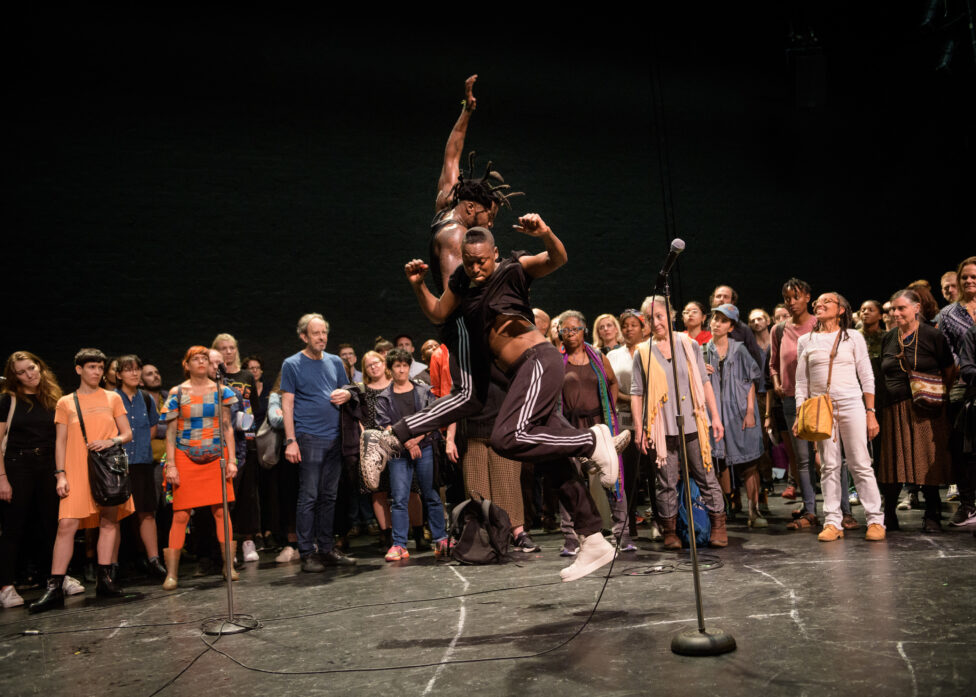
Nora Chipaumire’s #PUNK 100%POP *NIGGA, 2018 Photo: Ian Douglas
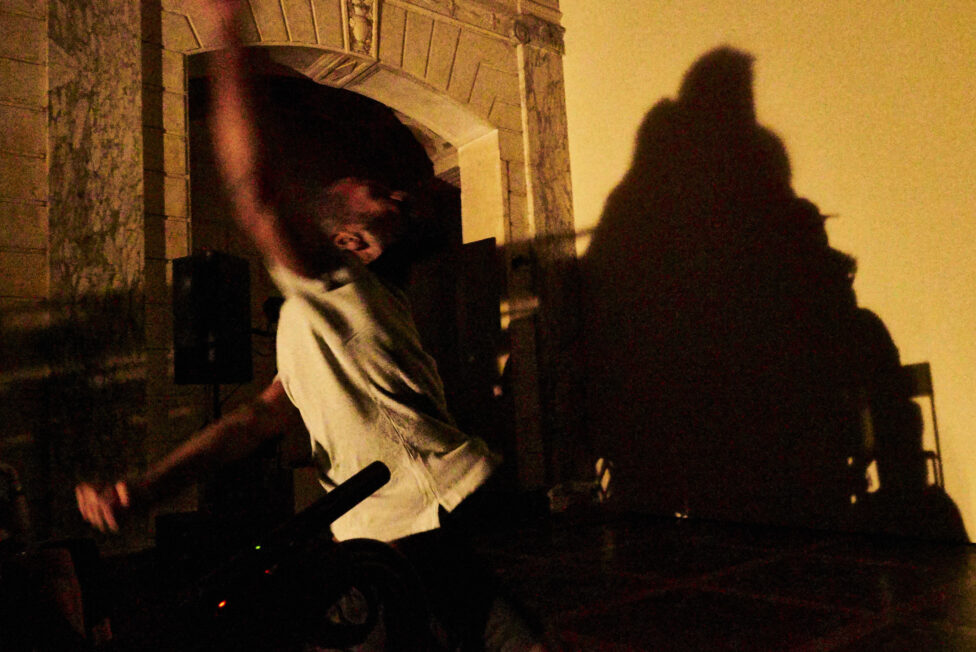
Justin Allen, Photo: Cameron Kelly Mc Leod Courtesy Issue Project Room
JA: What you’re saying about this continuum–I think this continuum also illuminates the conditions created by colonialism. Hardcore music, and the demographics that make those sounds, are ultimately responding to this history, as well as cultural tensions and the demands of masculinity. I love thinking about this as a continuum and not a separation.
NC: I think the separations may be an academic exercise or even an industrial and economic way to maximize something. If you separate things, you can sell them separately and make a lot of money from an individual product with an individual thing. Europe clashes with Africa and it becomes the history of modernity. This epidermis of modernity where black bodies can be bought and sold. This is part of the larger project discourse that I’m immersed in. To try and argue that, in spite of being born and raised on the continent of Africa, you still know the division between the African diaspora and the continent is rather superficial. Going back to this economies of black bodies, and what we are listening to, what is shaping us. This created a possibility for me to think about my present and my future. Instead of politicizing off of that sound, which I think was always political, I mean punk was always political, the Sex Pistols, the Clash, the Ramones, Patti Smith. We’re living in a time now where my agenda is not to forget. The project of not forgetting where we’ve come from, but not in a romantic way, but to find another way of speaking to the past. Capitalism is so rampant now that people don’t even remember when that was contested.
JA: And I think growing up where I did, the suburban landscape was almost designed to seem historyless or originless. I think a lot about mining histories to understand how the sounds of the music I listen to are formulated, in order to better understand where I’m from and who I am. How did history and social conditions shape these sounds and aesthetics? When working with experiences from my past in the present, it can be hard to pull apart and understand all of the things that went into making those experiences. Something I loved about your work is how long it was. When I came to The Kitchen and learned that it was going to be three hours, I was a bit intimidated. But, afterward I felt the length was necessary, I needed that space to pull everything apart. I notice you used a lot of visual art language to describe your performances, particularly portraiture and triptych. I’m curious about what inspires you to think about your performances in these terms.
NC: I don’t really believe in the division between sight, sound, hearing, feeling. I think it is all one whole thing. I’ve always been interested in making things. Even before my work was getting as much potential, I was always interested in how objects, visual objects and the body, animate the space and extend the storytelling. Performing with a live audience, I’m completely aware of the color of my skin, my haircut, whatever I put on. Everything is acting together to extend the narrative. The compositions of the visual accents are intended to expand on what I’m saying and hopefully, maybe, obscure a bit more.
JA: What makes you want to obscure?
NC: Not everything needs to be made transparent. There is a delight in making things oblique and inaccessible. One way for me to get that inaccessibility is using a visual thing, like an object. Or, light, that’s a material that can open up or close a space. You’re beyond what you can see. There’s also a space that you can’t see. I have as much interest in what I am closing off as what I am opening up. The entire big picture isn’t necessary in order to elucidate. To create a beautiful confusion that leaves people to want to learn more. To let people have questions. If you didn’t know that Zimbabwe became independent in 1980, and there’s still a whole politics of socialism and that pretty much shaped our universe. It’s okay to have questions. I don’t necessarily have to explain why I think Ronald Reagan affected us. I just need to mention the name and you can go around and think about it. That’s what I mean by closing spaces. I’m a huge fan of everything Kara Walker does and Ari Marcopoulos too, by having their massive presence in the work. Who can ask for more? Or the way Basquiat would work with the crossing-out, making what you’re looking at dissapear. The visual (and the invisible) is all part of the aesthetic. The aesthetic being what we’re trying to sculpt into being. We’re trying to shape something that people come to and share and witness and immerse in for a specific amount of time. You mentioned the length, the length was what it needed to be. It’s asking the public to be as committed as I am, to have to physically endure along with me. It’s not like the public is doing this thing for three hours and I’m just laying in bed like “mhm”. We are all working really hard, this is democracy or this is community.
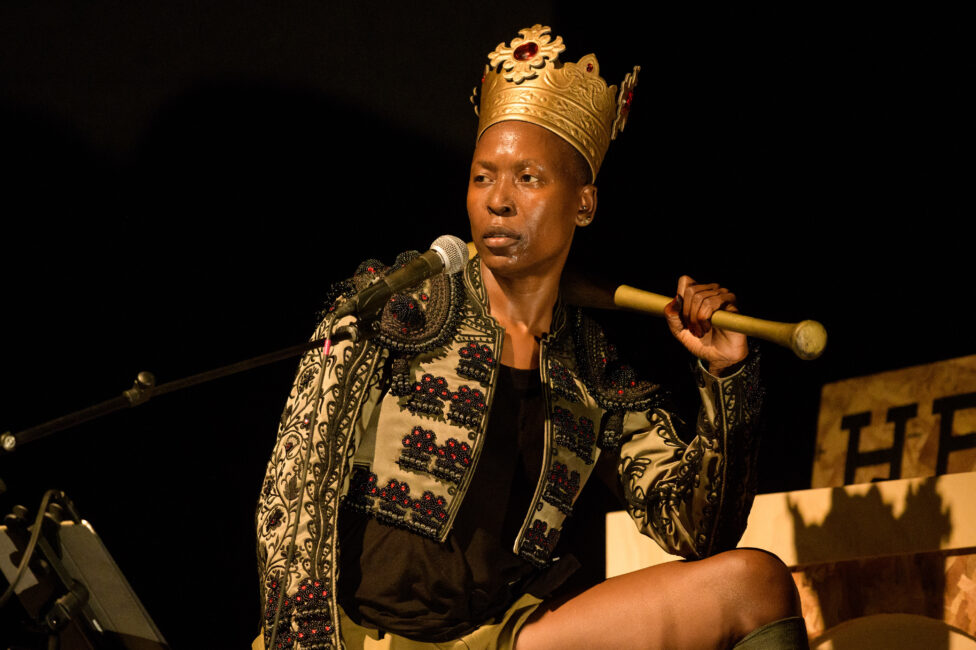
Nora Chipaumire’s #PUNK 100%POP *NIGGA, 2018 Photo: Ian Douglas
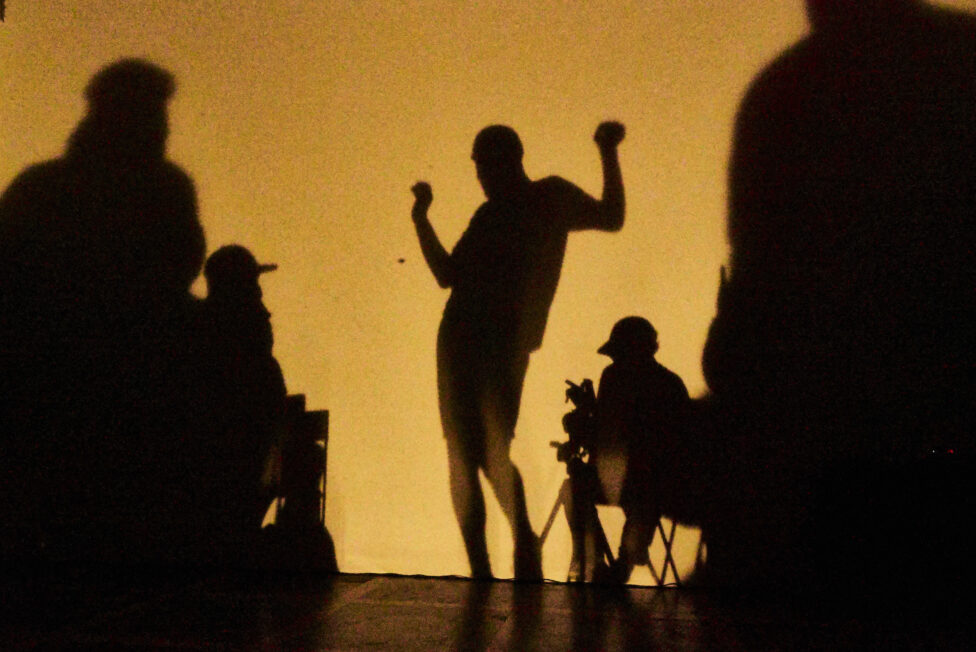
Justin Allen, Photo:Cameron Kelly Mc Leod Courtesy Issue Project Room 1
JA: And I loved the interplay between you, your fellow performers, and the audience. On the topic of the physicality of the performance, I wanted to ask–I’m currently working on assembling a hardcore band in which I will be the singer. I recently sang live for a performance and immediately noticed how my movements are changed as a singer with a microphone. I’m interested in hearing about your experience singing live. I wonder if you also have this shifted experience with using a microphone.
NC: The microphone is a real thing. My respect for punk rockers really grew so much as I was trying to manipulate the mic. Leaning into the microphone allows me to find new ways to sculpt the air with my body. Microphones are beyond props, they become extensions of the body. If you watch that Bad Brains guy, the lead singer was a magnificent person. I am very much in admiration of singers like James Brown, the way he would use the microphone. You have to really work to control that. I mean Grace Jones herself is no slacker at these things. I’m fascinated that you are also creating a band because this work pretty much has lead me to creating my own band. I feel like after every work, I am moving towards creating something essential like “okay we have to make our own sounds.” Even if it’s stealing other people’s sound and manipulating them. I had to buy a DJ set and it’s been hard just to learn how to use it. It’s been beautiful. Dave came in with a live guitar, we had one night with a drummer, we did it once in Europe and a horn player jumped in. It is cool to be learning what it means to be a band, and to make our own sound, while doing this aesthetic thing. We’re not really performing in music venues, we’re performing in places were people come in thinking they’re going to sit down and watch a dance. And then they get this live content that is so open. As far as I’m concerned, it is live art. Everything is in there. It’s a beautiful space to be, to be learning, and growing all at once. Creating stuff that we are all enjoying.
JA: I was surprised by how physical playing musical instruments can be.
NC: The physicality of making sound is really a beautiful thing. If you’re a person who makes gestures, who creates gestures, to learn what the instrument asks of you, how you use your body. I think it’s a new authentic way of arriving at new movements.
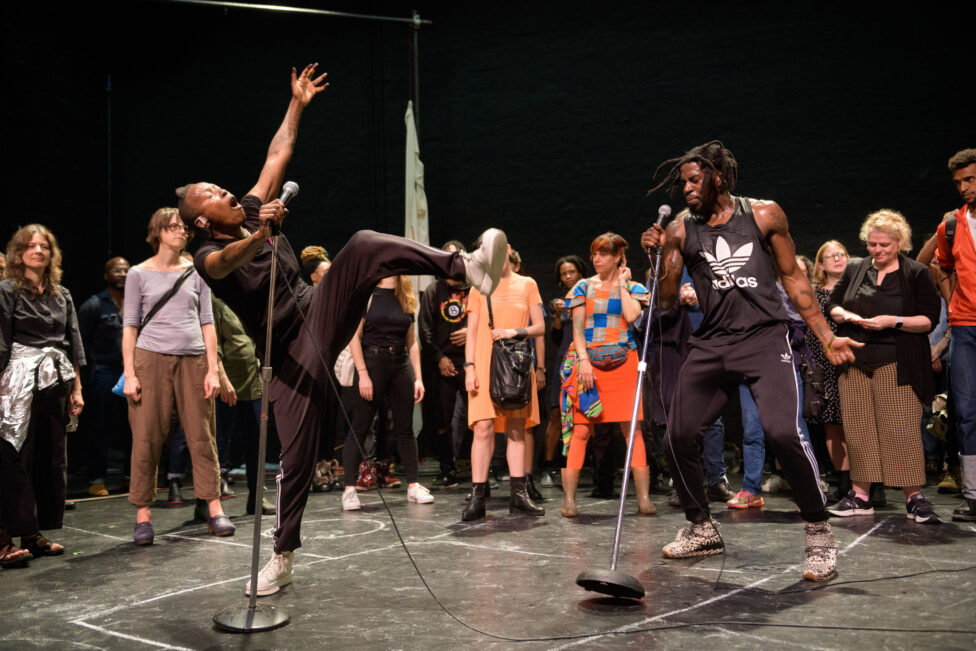
Nora Chipaumire’s #PUNK 100%POP *NIGGA, 2018, Photo: Ian Douglas
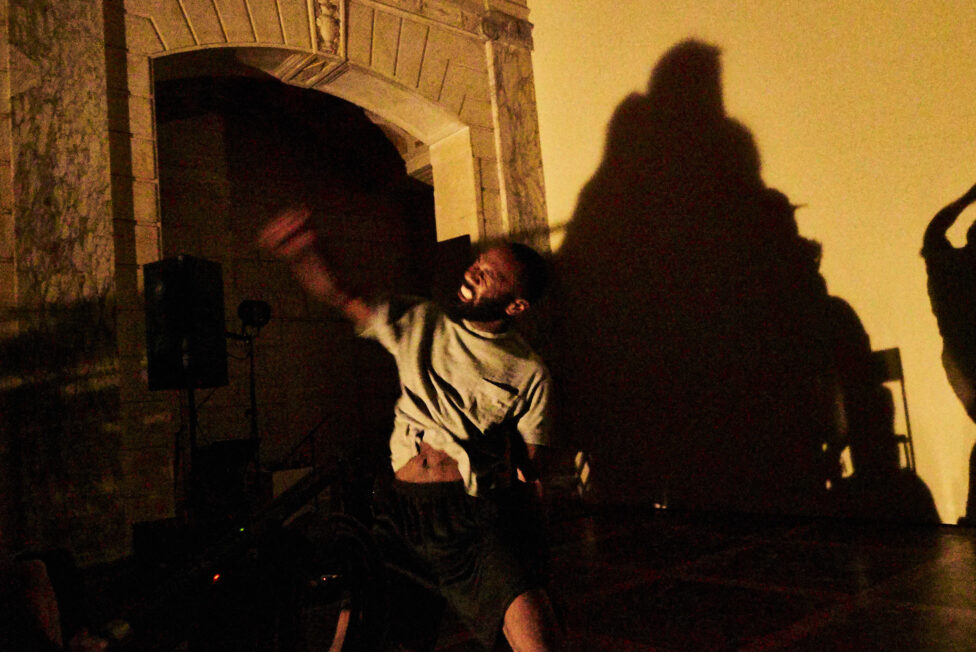
Justin Allen Photo: Cameron Kelly Mc Leod Courtesy Issue Project Room

